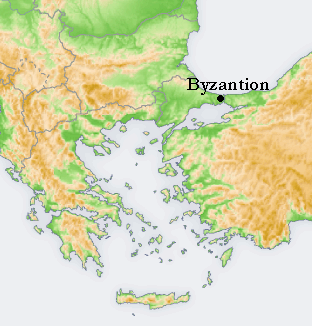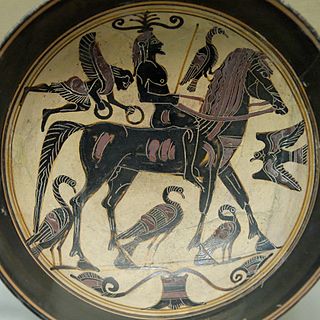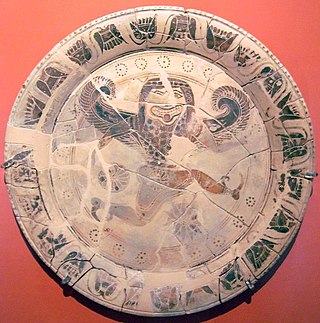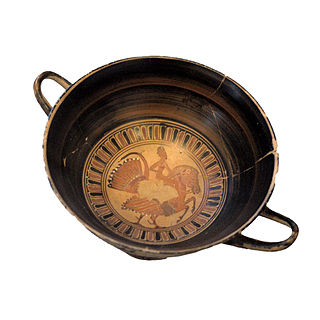
Byzantium or Byzantion was an ancient Greek city in classical antiquity that became known as Constantinople in late antiquity and Istanbul today. The Greek name Byzantion and its Latinization Byzantium continued to be used as a name of Constantinople sporadically and to varying degrees during the thousand year existence of the Byzantine Empire. Byzantium was colonized by Greeks from Megara in the 7th century BC and remained primarily Greek-speaking until its conquest by the Ottoman Empire in AD 1453.

A nymph is a minor female nature deity in ancient Greek folklore. Distinct from other Greek goddesses, nymphs are generally regarded as personifications of nature; they are typically tied to a specific place, landform, or tree, and are usually depicted as maidens. Because of their association with springs, they were often seen as having healing properties; other divine powers of the nymphs included divination and shapeshifting. Nymphs, like other goddesses, were immortal except for the Hamadryads, whose lives were bound to a specific tree.
Alope was in Greek mythology a mortal woman, the daughter of Cercyon, known for her great beauty.
Apollodorus was a popular name in ancient Greece. It is the masculine gender of a noun compounded from Apollo, the deity, and doron, "gift"; that is, "Gift of Apollo." It may refer to:
In Plato's Symposium, Penia, or Penae, is the personification of poverty and need. She conceived Eros with an intoxicated Porus in Zeus's garden while at Aphrodite's birthday. Her sisters are Amechania and Ptocheia. Penia was also mentioned by other ancient Greek writers such as Alcaeus, Theognis, Aristophanes, Herodotus, Plutarch, and Philostratus.
Heliodorus is a Greek name meaning "Gift of the Sun". Several persons named Heliodorus are known to us from ancient times, the best known of which are:

The Knights was the fourth play written by Aristophanes, who is considered the master of an ancient form of drama known as Old Comedy. The play is a satire on the social and political life of classical Athens during the Peloponnesian War, and in this respect it is typical of all the dramatist's early plays. It is unique, however, in the relatively small number of its characters, and this was due to its vitriolic preoccupation with one man, the pro-war populist Cleon. Cleon had prosecuted Aristophanes for slandering the polis with an earlier play, The Babylonians, for which the young dramatist had promised revenge in The Acharnians, and it was in The Knights that his revenge was exacted. The Knights won first prize at the Lenaia festival when it was produced in 424 BC.

The Birds is a comedy by the Ancient Greek playwright Aristophanes. It was performed in 414 BC at the City Dionysia in Athens where it won second place. It has been acclaimed by modern critics as a perfectly realized fantasy remarkable for its mimicry of birds and for the gaiety of its songs. Unlike the author's other early plays, it includes no direct mention of the Peloponnesian War and there are few references to Athenian politics, and yet it was staged not long after the commencement of the Sicilian Expedition, an ambitious military campaign that greatly increased Athenian commitment to the war effort. In spite of that, the play has many indirect references to Athenian political and social life. It is the longest of Aristophanes's surviving plays and yet it is a fairly conventional example of Old Comedy.
Apollonius is a masculine given name which may refer to:

Aristarchus of Samothrace was an ancient Greek grammarian, noted as the most influential of all scholars of Homeric poetry. He was the head librarian of the Library of Alexandria and seems to have succeeded his teacher Aristophanes of Byzantium in that role.
Aristophanes of Byzantium was a Hellenistic Greek scholar, critic and grammarian, particularly renowned for his work in Homeric scholarship, but also for work on other classical authors such as Pindar and Hesiod. He soon moved to Alexandria and studied under Zenodotus, Callimachus, and Dionysius Iambus. He succeeded Eratosthenes as head librarian of the Library of Alexandria at the age of sixty. His students included Callistratus, Aristarchus of Samothrace, and perhaps Agallis. He was succeeded by Apollonius "The Classifier". Aristophanes' pupil, Aristarchus of Samothrace, would be the sixth head librarian at the Library of Alexandria.
In Greek mythology, Praxidice or Prakidike may refer to the following characters:

Anagyrus or Anagyrous, also Anagyruntus or Anagyrountos (Ἀναγυροῦντος), was a deme of ancient Attica, belonging to the phyle Erechtheis, situated in the south of Attica near the promontory Zoster. Pausanias mentions at this place a temple of the mother of the gods.
Aristophanes was an Ancient Greek comic dramatist known for his plays The Frogs, The Birds, The Clouds, and Lysistrata.

A hippalectryon, or hippalektryon, is a type of fantastic hybrid creature of Ancient Greek folklore; half-horse (front) and half-rooster (hind), including the tail, wings and hind legs. Its colour varies between yellow and reddish. No myths related to it are currently known.
The idea of life imitating art is a philosophical position or observation about how real behaviors or real events sometimes resemble, or feel inspired by, works of fiction and art. This can include how people act in such a way as to imitate fictional portrayals or concepts, or how they embody or bring to life certain artistic ideals. The phrase may be considered synonymous with anti-mimesis, the direct opposite of Aristotelian mimesis: art imitating real life. The idea's most notable proponent is Oscar Wilde, who opined in an 1889 essay that, "Life imitates Art far more than Art imitates Life". In the essay, written as a Platonic dialogue, Wilde holds that anti-mimesis "results not merely from Life's imitative instinct, but from the fact that the self-conscious aim of Life is to find expression, and that Art offers it certain beautiful forms through which it may realise that energy."
Eighteen Epigrams are attributed to Plato, most of them considered spurious. These are short poems suitable for dedicatory purposes written in the form of elegiac couplets.
Clitophon, son of Aristonymus was an ancient Athenian oligarchic statesman and intellectual. His involvement in Athenian politics helped pave the way for the rule of the Four Hundred following the Athenian coup of 411 BCE. Clitophon also appears in the writing of Plato, and presents a philosophy of "thoroughgoing normative relativism" in a brief role in the Republic.
Andron is the name of a number of different people in classical antiquity:
Antiphilus is an ancient Greek male name. It can refer to any of the following:




